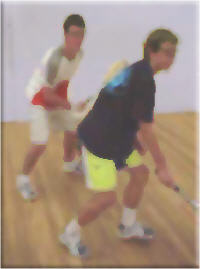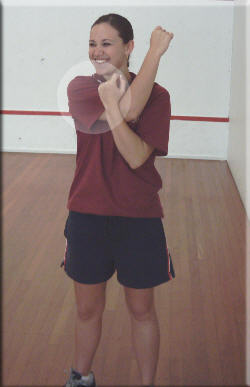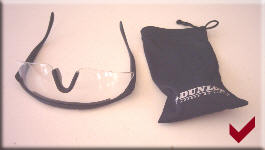About Player Safety

- Squash can be a high intensity sport and, as such deserves to be approached with some caution especially if you belong to one of the high risk categories.
- As with any physical activity there is always a danger of injury but if these guidelines are followed, it will reduce (but not eliminate) the dangers of participation.
|
General Guidelines

- A sufficient warm up should take place before playing, including stretching
- If you have never played or it is some time since your last game, be sure that you don't over exert.
- Squash can be a quick game, be aware of how hard you are pushing yourself.
- Err on the side of caution.
- If you have not participated in an intense sport for some time be aware of trying to do what you used to do.
- Because of the nature of Squash, a very quick rally is sometimes not felt for up to 10 to 20 seconds.
- If oxygen debt is created, the heart may have to start pumping very quickly to replace the oxygen stores in the muscles.
- Be wary this can happen easily especially if you have put on a few kilos since your last game!
- Ease into the sport carefully.
- Extend your playing time or intensity levels over a few weeks and visits
- If you are over 40 years and still in good shape, you should still see a sports oriented medical practitioner before playing.
- Continue to have check ups every few years whilst playing
- Ensure that you are fully hydrated before during and after playing.
- A few glasses of water in the hour leading up to the game will ensure you start hydrated.
- More water during and after especially in hot and/or humid conditions. (Clear urine is usually a sign of full hydration).
- Sports drinks can be used in place of water but not "pick me up" drinks like "Red Bull", "V" etc.
- Cold water is usually metabolised quicker than warm water.
- Alcoholic drinks such as beer etc., will tend to dehydrate.
- Do not play if you have an injury or illness that will be affected by your playing.
- Any injuries occurring during a game should be treated as soon as possible after the occurrence.
- Advice/treatment should be sought from a suitably qualified practitioner as soon as practicable after.
- It is strongly recommended that all Squash players wear protective eyewear that at least meets USA ASTM F803 or Australian Standard AS4066:1992.
- Whilst the risk of eye injury is relatively low, if an injury does occur, it is very often serious.
- Protective eyewear that meets the aforementioned standards eliminates most of the risk.
- Do NOT play if you fall into one of the following high risks groups, without first seeing a qualified medical practitioner.
|
High Risk GroupsHeart Problems
- If you have been diagnosed with heart disease, do not play Squash (or any other high intensity sport) without consulting your Medical Practitioner.
- If you have one of the following risk factors, you should consult your Medical Practitioner. Family history of heart disease occurring at an early age
- Smoking
- Diabetes
- Elevated Blood cholesterol
- Low HDL
- Cholesterol
- High Blood Pressure
- Overweight (especially former players)
- Further check ups should occur every couple of years if you continue to play.
|
Vision Problems

- Protective eyewear must be worn by players:
- who have had recent eye surgery
- with Amblyopia (lazy eye)
- with only one good eye
- with a history of pre retinal detachment conditions
- who are diabetics with retinopathy.
- If you are in any doubt as to your eye condition, consult an Ophthalmologist.
More Pics... I-Max - the full shield
|
Pregnant Women
- Pregnant women should not take up squash during their pregnancy.
- Most can continue to play Squash up to about the 20th week, however they should consult their Medical Practitioner before doing so.
- Caution should be exercised to avoid overheating and dehydration.
- Keep the session to 30 minutes or less. Keep the heart rate to 140 bpm or less.
- Extension during stretching should be reduced significantly because of physiological changes which occur in preparation for the birth.
- Try to "wind down" during the last 5 minutes of play to cool down.
- Some light stretching will also help but be sure to under stretch rather than overstretch.
- Playing Squash or other high intensity physical activity whilst pregnant can be risky.
- At all times consult your Medical Practitioner.
- If very fit playing in a more controlled environment (eg, drills); may be possible with the ok of the Medical Practitioner.
|
Disclaimer
- Last word for players in High Risk Groups.
- If you are ever in any doubt as to your ability to withstand the rigours of high intensity sport or physical activity, consult a medical practitioner with experience in sports medicine.
 Squashgame Gold: Advanced Text and Video Content Squashgame Gold: Advanced Text and Video Content
Play safelyAm I playing safely?
| Good |
Bad |
| I wear safety goggles |
I am afraid to watch the ball in case I get hit. |
| As soon as I hit the ball I move out of my opponent's way. |
My opponent and I are always bumping into each other. |
| I try to move my body to watch the ball as it travels so I can move into a better position to recover the return stroke. |
When the ball goes behind me I just hope I don't get hit by the return. |
| By turning side on to strike the ball I can get out of the way easier. |
The ball keeps coming back to me and I cannot clear the ball. |
| My serves force the opponent into the side wall or back corner. |
My serves end up down the middle of the court. |
| I felt really fit on court |
I was huffing and puffing and my asthma spray was at home. |
|



